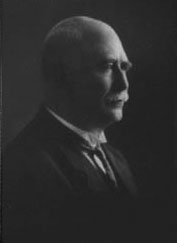William Ferguson Massey

Massey was born on 26 March 1856 in Limavedy, Ireland. He was educated at a national school there and at a secondary school was kept by a classical scholar. While he was still at school his father sold the farm and emigrated to New Zealand. Massey arrived in the City of Auckland on 11 December 1870 and settled in Taranaki.
Massey worked with his father until reaching the age of 17. He later purchased a threshing machine and leased a farm of 100 acres in Mangere. In 1882 he married Christina Allen Paul, the daughter of a neighbouring farmer. He soon became a member of the Mangere Road Board and chairman of the school committee, and in 1890 became President of Mangere Farmer’s Club.
In 1893 Massey contested the seat of Franklin, but was narrowly defeated. A few weeks later the Waitemata seat became vacant, and Massey contested and took the seat. At the next election, 1896, he stood for his own district, Franklin. He held the seat without interruption until his death. In September 1903, after the opposition had been without leader for some time, Massey was elected leader of the Conservative Party (later to become the Reform Party). He led the party steadily forward to victory in 1912. On 10 July 1912 Massey was sworn in as Prime Minister, it was 5 months since Parliament had first sat after the election, and there had been much confusion over who should be forming a ministry. It was the first ministry from the Conservative side since 1890.
The general election on 10 December 1914 was fought under the influence of war. The outcome was that Massey had a following of 40 in the new Parliament, Ward had 4 and Labour 4 members. Convinced that with such a precarious majority he was no longer justified in taking upon his own party the whole responsibility of administering the government in a time of crisis, Massey made overtures to the other party leaders which resulted in the formation of a National Government. Massey remained the Prime Minister (sworn in 12 August 1915), and Minister of Lands and Labour.
Massey attended the Peace Conference at Versailles in 1919, but before he returned it became clear that the and the Liberal leader could not agree on some critical issues. The gap became more pronounced, and on 21 August 1919 the Liberals withdrew from the National ministry. Massey quickly reformed the cabinet, and when the general elections were held on 17 December that year, the Reform party returned to office. It was the largest majority Massey ever commanded as Prime Minister.
As the 1922 election approached, Massey’s health began to deteriorate, he had spent 10 difficult years as Prime Minister. After the election, faced with the probable co-operation of Labour and the Liberal party, which would make voting equal, however Massey still formed a ministry. He lost two of his colleagues by death, and he was still bearing the load of the Treasury as well as the Prime Ministership.
Massey’s health began to suffer severely under the prolonged strain, and he died on 10 May 1925.
Document Actions

 Like us on Facebook
Like us on Facebook